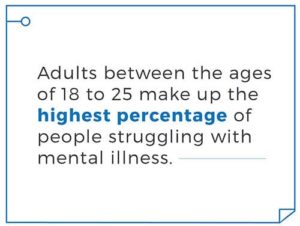- May 1
- Dual Diagnosis TreatmentMental Health TreatmentPreventionTreatment
May marks Mental Health Awareness Month, a time dedicated to raising awareness and reducing stigma. To start our month-long conversation about mental health, we started asking some questions:
Mental Health Awareness Month
Millions of people in the United States deal with mental health disorders. Yet less than half receive help. Chances are you know someone with a mental illness or someone who is affected by a person struggling with a mental illness.
According to recent studies, adults between the ages of 18 to 25 make up the highest percentage of people struggling with mental illness, but compared to other age groups, they also report the lowest rates of seeking treatment.
Why don’t more people seek treatment for mental health?
One of the main hurdles preventing people from seeking necessary treatment is the stigma surrounding mental health. Many people feel their mental health is not as important as their physical health or feel ashamed or embarrassed to admit they have a mental problem. As a result, some ignore their mental health concerns while others try to treat their symptoms by themselves.
What are some signs of a mental health disorder?
The signs of each mental health disorder are unique to that disorder, but here are a few to look out for:
- Extreme changes in mood and behavior
- Changes in work or school performance
- Suicidal thoughts
- Prolonged feelings of anger or sadness
- Withdrawal from friends and family
- Struggles with carrying out day-to-day tasks
What are some examples of mental health disorders?
Depression and anxiety are the two most prevalent mental health disorders in the United States; however, many Americans also live with obsessive compulsive disorder, bipolar disorder, schizophrenia, and post-traumatic stress disorders, among others. The severity of mental health disorders also varies by individual.
Co-Occurring Substance Use Disorders
Nearly 39 percent of people with a substance use disorder also have a mental health disorder. In an effort to cope with the symptoms from their mental health disorder, many people turn to drugs and alcohol. The most common substance people turn to for help is alcohol. However, alcohol and many other drugs can exacerbate symptoms.
How can we reduce stigma?
In the past few years, there has been a change in the conversation around mental health. Mental illnesses, such as bipolar disorder, have garnered more attention due to more celebrities, such as Mariah Carey, sharing their battles. If we continue asking questions and normalizing conversations about mental illness, then we can continue investing in and improving treatment for mental health.
To learn more about mental health awareness month and receive help with mental health-related issues, give Gateway a call at 877.505.4673.



